#Korean Confederation of Trade Unions
Text


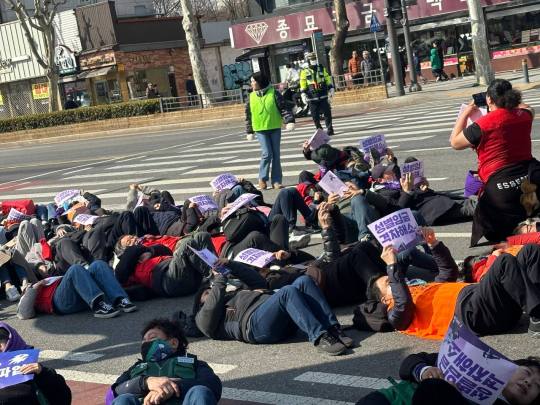
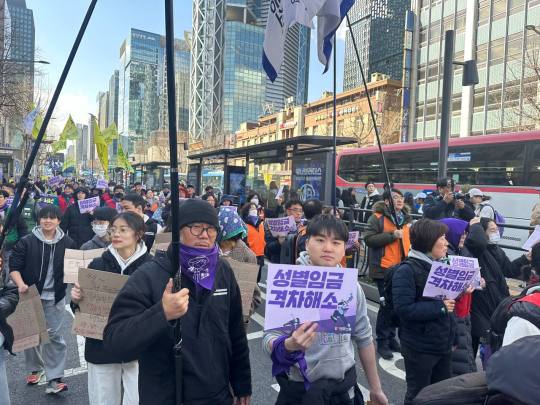
Korean IT Union’s International Women’s Day post
#south korea#IT union#international women's day#Korean Confederation of Trade Unions#feminist ideological verification#thought verification#feminism
40 notes
·
View notes
Link
Excerpt
An estimated 25,000 union members took part in the rally in downtown Seoul, causing massive traffic congestion and leading to some 80 noise complaints being filed with the police.
The union falls under the umbrella Korean Confederation of Trade Unions (KCTU).
"Our Constitution guarantees the freedom of assembly and demonstration, and as president, I, too, have respected this," Yoon said.
"However, guaranteeing the freedom of assembly and demonstration does not mean infringements on another person's freedoms and basic rights, or acts disturbing the public order, are justified."
Yoon said the previous administration effectively abandoned its law enforcement duties with regard to illegal rallies and demonstrations, leading to intolerable levels of inconvenience for the people.
"It will be difficult for the people to tolerate the actions of the KCTU during the rally that infringed on people's freedoms and basic rights, and disturbed the public order," he said. "Our government will not neglect or tolerate any form of illegal action."
Related links and notes
South Korean Government Program to Import Filipina Maids - May 2023
Korea: union offices raided - January 2023
The Korean Confederation of Trade Unions (KCTU) had their offices raided twice this week, by the National Intelligence Service (NIS), alleging that members of KCTU violated the National Security Act.
No Letup in Strikes as KCTU Mobilizes - June 2003
The KCTU also held rallies in 18 regions all over the country, demanding the abolition of the National Education Information System (NEIS). The Korean Public Officials Union’s 500 members also held a rally at Jongmyo Park, demanding three labor rights—to organize, negotiate and to take group action.
The 25,000 day and night-shift employees of the Hyundai Motor Company Union each held a four-hour strike. They plan to hold another six-hour strike and to refuse overtime work for two hours on June 26.
The Ministry of Labor said that the two-day strike is predicted to cause a total of W73.6 billion in losses for Hyundai Motors. A Kia Motor factory in Hwaseong will suffer from W1.2 billion in losses, and Ssangyong Motor will suffer a W3 billion loss, for a total of W88 billion in damage to the three firms, the ministry said.
Furthermore, this strike is expected to affect large-scale manufacturers such as Doosan Heavy Industry, Tongil Heavy Industry, Hanjin Heavy Industry, and Hyundai Samho Heavy Industries. The labor unions of most of the companies are to participate in another KCTU general strike on July 2, which could sink the firms’ export plans.
Union Is Ensuring Its Own Demise - January 5, 2003
Workers of Tongil Heavy Industries Co. and Kohap Corporations, which are under court receivership and a debt restructuring program, respectively, are on strike, demanding pay raises and protesting restructuring.
Tongil/S&T?
Tongil was well known for its militant labor union, which led Choi to hesitate about an acquisition at first.
South Korea: More than 100 Trade Unionists Detained - October 2, 1998
Even in South Korea, Few Know Extent of Rev. Moon’s Empire (1988)
Kishida continues shallow MRA-style apologies for war crimes
Catholic mass in South Korea demanding President Yoon to resign for “selling out Korea to Japan”
The Imperial Ghost in the Neoliberal Machine (Figuring the CIA) - Koichiro Osaka
#Yoon Suk Yeol#korea#south korea#republic of korea#south korean government#government#politics#labor#labor organizing#kctu#leftist politics#protests#right-wing politics#conservative politics#korean politics#south korean politics#Korean Confederation of Trade Unions#tongil heavy industries#tongil heavy industry worker's union
1 note
·
View note
Text
In America these days, almost any information about North Korea, be it rumor, fake news, or just plain silly, becomes fodder for the mainstream media. [...]
But when it comes to South Korea, which hosts 28,500 American ground troops and the Pentagon’s largest military base outside of North America, U.S. media coverage is, shall we say, highly selective. That was made resoundingly clear on August 14, when Seoul was the scene for the largest public demonstration in decades against the U.S. military presence in South Korea.
Amazingly, not a word about the protest appeared in the U.S. media.
That Saturday, thousands of people chanting “this land is not a U.S. war base” demonstrated against Ulchi Freedom Shield, the first large-scale military exercises between U.S. and South Korean forces since 2017. The protests were organized by the Korean Confederation of Trade Unions (KCTU), South Korea’s second-largest labor federation. They were joined by a range of progressive allies, including People’s Solidarity for Participatory Democracy (PSPD), an influential citizen’s group founded in 1994.
“At a time when military tensions on the Korean Peninsula are escalating and there is no clue for inter-Korean dialogue, we are concerned that an aggressive large-scale military exercise will exacerbate the situation,” PSPD declared. “We once again urge the US and ROK governments to suspend the ROK-US joint military exercise and make efforts to create conditions for dialogue.” At the demonstration, protesters took direct aim at the heart of U.S. policy in Korea, with signs that read “No war rehearsal, No U.S.” and “No Korea-U.S.-Japan military cooperation.”
Outside of the Korean press, the only outlets to cover this massive showing against militarism were Iran’s Press TV and China’s CGTN, which provided extensive video of the mobilization. The single print story on the march appeared in Xinhua, China’s daily wire service. Neither the New York Times or the Washington Post, which often set the pace for U.S. press coverage of Asia, deemed the demonstration newsworthy.
23 Aug 22
722 notes
·
View notes
Text
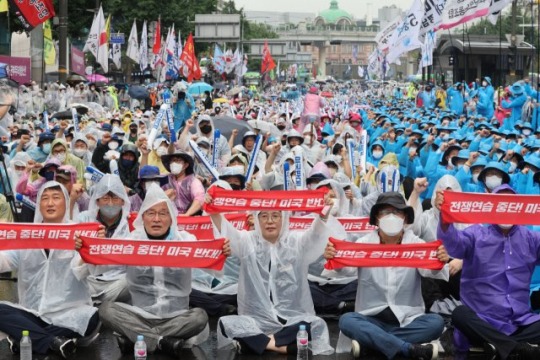
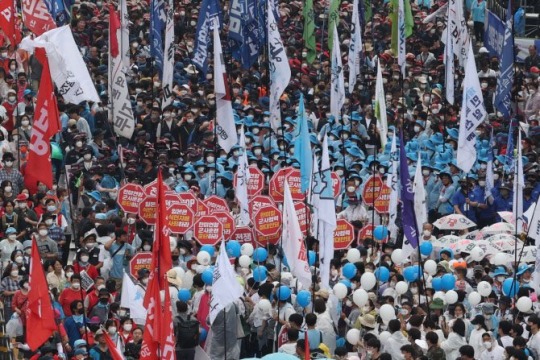
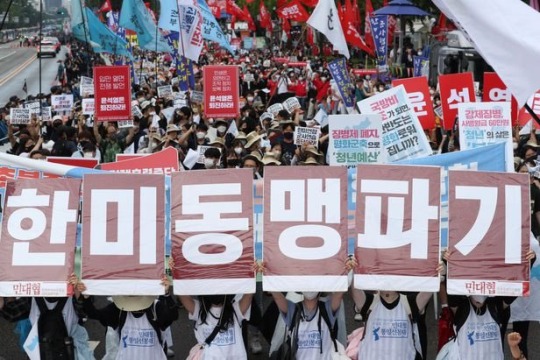
A massive anti-US rally was held in Seoul on August 13th 2022. The participants demanded the South Korean government stop the South Korea-U.S. joint military exercises scheduled for this month, and called for the dissolution of the SK-U.S. alliance and the withdrawal of US forces in S.Korea.
Yang Kyung-soo, chief of the Korean Confederation of Trade Unions (KCTU), a major umbrella labor union of South Korea, said at the protest rally that staging military exercises in preparation for a war is tantamount to intending to wage a war, according to local newspaper Chosun Ilbo.
66 notes
·
View notes
Text
[1일 1포 - 25/28]
Went to a union meeting today, so here are some words more or less related (in my mind, at least)
노동조합 (노조) - labor union
전국민주노동조합총연맹 (민주노총) - Korean Confederation of Trade Unions (KCTU) [this one is more left-leaning]
한국노동조합총연맹 (한국노총) - Federation of Korean Trade Unions (FKTU) [this one is more right-leaning]
노동자, 근로자 - worker
조합비 - union dues
강령 - a creed, doctrine
(총)파업 - (general) strike
시위 - protest, demonstration
선언하다 - to declare, proclaim
연대하다 - to be in solidarity, unity
인권 - human rights
최저임금 - minimum wage [currently 9,620원 = $7.31]
근로자의 날 (5월 1일) - Labor Day, Workers' Day (May 1st)
민주주의 - democracy
자본주의 - capitalism
사회주의 - socialism
공산주의 - communism
And these are the political parties that are generally supportive of the KCTU: 진보당 (Progressive Party), 노동당 (Labor Party), 정의당 (Justice Party), 녹색당 (Green Party)
#langblr#studyblr#language learning#korean#Korean language#there is power in a union#politics#vocabulary#korean vocabulary#korean langblr#feb 1일 1포
8 notes
·
View notes
Text
Intervento della ILO a favore dei camionisti sudcoreani
Dopo lo sciopero dei camionisti, interviene anche l'Organizzazione Internazionale del Lavoro a difesa dei lavoratori sudcoreani
Hankyoreh riporta in un articolo di oggi che l'ILO (International Labour Organization) sta intervenendo contro la risposta dura del governo Yoon ai camionisti, in sciopero da fine Novembre, in quanto la risposta sarebbe "in violazione delle convenzioni fondamentali" - più precisamente della Convenzione ILO n. 87 sulla libertà di associazione e la tutela del diritto di organizzazione, e Convenzione n. 29 sul lavoro forzato.
Perché i camionisti stanno scioperando?
Lo sciopero è stato organizzato dalla Cargo Truckers Solidarity Division, nell'ambito del Korean Public Service and Transport Workers' Union (KPTU), affiliato alla Korean Confederation of Trade Unions (KCTU). Le motivazioni sono legate agli aumenti del prezzo del trasporto a causa della crisi del carburante (crisi che tocca anche l'Europa) - i camionisti chiedono che il prezzo minimo rimanga invariato, anche se la scadenza dello stesso sarà a fine 2022; le proteste si sono spostate poi contro il governo e la risposta ricevuta dagli scioperanti: il governo ha ordinato a circa 2.500 autisti di camion di cemento di tornare al lavoro, affermando che il loro sciopero sta mettendo in crisi l'economia nazionale.
I manifestanti, per lo più membri della KCTU, hanno accusato il governo del presidente Yoon Suk Yeol di oppressione del lavoro e di ignorare quelle che hanno descritto come le dure condizioni di lavoro e le difficoltà finanziarie dei camionisti. (Fonte)
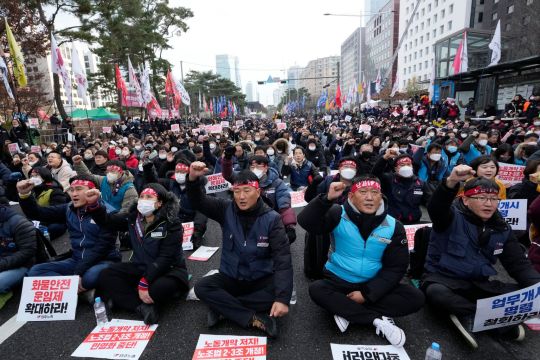
4 notes
·
View notes
Text
History
December 13, 1545 - The Council of Trent, summoned by Pope Paul III, met to discuss doctrinal matters including the rise of Protestantism.
December 13, 1577 - Francis Drake departed Plymouth, England, in the Golden Hind on his voyage around the world.
December 13, 1642 - New Zealand was discovered by Dutch navigator Abel Tasman of the Dutch East India Company.
December 13, 1862 - During the American Civil War, the Battle of Fredericksburg occurred in Virginia as the Union Army of the Potomac under General Burnside suffered a costly defeat, losing 12,653 men after 14 frontal assaults on well entrenched Rebels on Marye's Heights. "We might as well have tried to take hell," a Union soldier remarked. Confederate losses were 5,309. "It is well that war is so terrible - we should grow too fond of it," stated Confederate General Robert E. Lee during the fighting.
December 13, 1937 - The beginning of one of the worst atrocities of World War II as the Chinese city of Nanking (Nanjing) was captured by the Japanese. Over the next six weeks, the Rape of Nanking occurred in which Japanese soldiers randomly attacked, raped and indiscriminately killed an estimated 200,000 Chinese persons.
December 13, 1981 - In its struggle to maintain Communism, the Polish government imposed martial law and took steps to stifle the growing power of the pro-democratic trade union Solidarity.
December 13, 1991 - North and South Korea signed a treaty of reconciliation and nonaggression which also formally ended the Korean War, although actual fighting had ceased in 1953.
Birthday - German writer Heinrich Heine (1797-1856) was born in Dusseldorf. Best known for his statement made a hundred years before the advent of book-burning Nazis in Germany - "Where books are burned, human beings are destined to be burned too."
Birthday - Mary Todd (1818-1882) was born in Lexington, Kentucky. She became the wife of Abraham Lincoln, the 16th U.S. President.
Birthday - American clergyman and composer Phillips Brooks (1835-1893) was born in Boston, Massachusetts. He wrote the lyrics for the popular Christmas Carol, O Little Town of Bethlehem.
1 note
·
View note
Text
Events 8.9
48 BC – Caesar's Civil War: Battle of Pharsalus: Julius Caesar decisively defeats Pompey at Pharsalus and Pompey flees to Egypt.
378 – Gothic War: Battle of Adrianople: A large Roman army led by Emperor Valens is defeated by the Visigoths. Valens is killed along with over half of his army.
1173 – Construction of the campanile of the Cathedral of Pisa (now known as the Leaning Tower of Pisa) begins; it will take two centuries to complete.
1329 – Quilon, the first Indian Christian Diocese, is erected by Pope John XXII; the French-born Jordanus is appointed the first Bishop.
1428 – Sources cite biggest caravan trade between Podvisoki and Republic of Ragusa. Vlachs committed to Ragusan lord Tomo Bunić, that they will with 600 horses deliver 1,500 modius of salt. Delivery was meant for Dobrašin Veseoković, and Vlachs price was half of delivered salt.
1500 – Ottoman–Venetian War (1499–1503): The Ottomans capture Methoni, Messenia.
1610 – The First Anglo-Powhatan War begins in colonial Virginia.
1810 – Napoleon annexes Westphalia as part of the First French Empire.
1814 – American Indian Wars: The Creek sign the Treaty of Fort Jackson, giving up huge parts of Alabama and Georgia.
1830 – Louis Philippe becomes the king of the French following abdication of Charles X.
1842 – The Webster–Ashburton Treaty is signed, establishing the United States–Canada border east of the Rocky Mountains.
1854 – American Transcendentalist philosopher Henry David Thoreau publishes his memoir Walden.
1855 – Åland War: The Battle of Suomenlinna begins.
1862 – American Civil War: Battle of Cedar Mountain: At Cedar Mountain, Virginia, Confederate General Stonewall Jackson narrowly defeats Union forces under General John Pope.
1877 – American Indian Wars: Battle of the Big Hole: A small band of Nez Percé Indians clash with the United States Army.
1892 – Thomas Edison receives a patent for a two-way telegraph.
1897 – The first International Congress of Mathematicians is held in Zürich, Switzerland.
1902 – Edward VII and Alexandra of Denmark are crowned King and Queen of the United Kingdom of Great Britain and Ireland.
1907 – The first Boy Scout encampment concludes at Brownsea Island in southern England.
1925 – A train robbery takes place in Kakori, near Lucknow, India, by the Indian independence revolutionaries, against British government.
1936 – Summer Olympics: Jesse Owens wins his fourth gold medal at the games.
1942 – World War II: Battle of Savo Island: Allied naval forces protecting their amphibious forces during the initial stages of the Battle of Guadalcanal are surprised and defeated by an Imperial Japanese Navy cruiser force.
1944 – The United States Forest Service and the Wartime Advertising Council release posters featuring Smokey Bear for the first time.
1944 – Continuation War: The Vyborg–Petrozavodsk Offensive, the largest offensive launched by Soviet Union against Finland during the Second World War, ends to a strategic stalemate. Both Finnish and Soviet troops at the Finnish front dug to defensive positions, and the front remains stable until the end of the war.
1945 – World War II: Nagasaki is devastated when an atomic bomb, Fat Man, is dropped by the United States B-29 Bockscar. Thirty-five thousand people are killed outright, including 23,200–28,200 Japanese war workers, 2,000 Korean forced workers, and 150 Japanese soldiers.
1945 – The Red Army invades Japanese-occupied Manchuria.
1960 – South Kasai secedes from the Congo.
1965 – Singapore is expelled from Malaysia and becomes the only country to date to gain independence unwillingly.
1969 – Tate–LaBianca murders: Followers of Charles Manson murder pregnant actress Sharon Tate (wife of Roman Polanski), coffee heiress Abigail Folger, Polish actor Wojciech Frykowski, men's hairstylist Jay Sebring and recent high-school graduate Steven Parent.
1970 – LANSA Flight 502 crashes after takeoff from Alejandro Velasco Astete International Airport in Cusco, Peru, killing 99 of the 100 people on board, as well as two people on the ground.
1971 – The Troubles: In Northern Ireland, the British authorities launch Operation Demetrius. The operation involves the mass arrest and internment without trial of individuals suspected of being affiliated with the Irish Republican Army (PIRA). Mass riots follow, and thousands of people flee or are forced out of their homes.
1973 – Mars 7 is launched from the USSR.
1974 – As a direct result of the Watergate scandal, Richard Nixon becomes the first President of the United States to resign from office. Vice President Gerald Ford becomes president.
1991 – The Italian prosecuting magistrate Antonino Scopelliti is murdered by the 'Ndrangheta on behalf of the Sicilian Mafia while preparing the government's case in the final appeal of the Maxi Trial.
1993 – The Liberal Democratic Party of Japan loses a 38-year hold on national leadership.
1999 – Russian President Boris Yeltsin fires his Prime Minister, Sergei Stepashin, and for the fourth time fires his entire cabinet.
2006 – At least 21 suspected terrorists are arrested in the 2006 transatlantic aircraft plot that happened in the United Kingdom. The arrests are made in London, Birmingham, and High Wycombe in an overnight operation.
2007 – Air Moorea Flight 1121 crashes after takeoff from Moorea Airport in French Polynesia, killing all 20 people on board.
2013 – Gunmen open fire at a Sunni mosque in the city of Quetta killing at least ten people and injuring 30.
2014 – Michael Brown, an 18-year-old African American male in Ferguson, Missouri, is shot and killed by a Ferguson police officer after reportedly assaulting the officer and attempting to steal his weapon, sparking protests and unrest in the city.
2021 – The Tampere light rail officially started operating.
2 notes
·
View notes
Text
Within the past two years, South Korea has seen major labor actions, including a general strike in October of 2021, and major crackdowns on organized labor, including the national intelligence agency raiding the offices of the Korean Confederation of Trade Unions in January of this year. In that same time, military and geopolitical tensions in the region have been rapidly intensifying. What is going on? What is the state of organized labor in South Korea, and how have imperialist and capitalist pressures, especially from the US, shaped the terrain upon which working people across the Korean Peninsula are struggling to live and work with dignity? We talk about all of this and more with Ju-Hyun Park, author, organizer, and Engagement Editor at The Real News Network.
1 note
·
View note
Text
Just read what it is about today - "Unionized workers affiliated with the Korean Confederation of Trade Unions (KCTU) plan to strike in Seoul, May 16-17. The purpose of the 48-hour strike is to address various issues, including commemorating the death of a construction official who committed suicide, as well as calling for the resignation of President Yoon Suk Yeol."
0 notes
Text
South Korean Government Program to Import Filipina Maids
Tweets from Raphael Rashid (koryodynasty)
The South Korean government is considering a pilot programme to import Filipina maids to Seoul later this year to ease childcare burdens and address the low birthrate problem. But concerns have been raised about forced labour and impact on local workers.
https://www.news1.kr/articles/5041042
Bringing foreign nannies and housekeepers to South Korea to help increase the country's birthrate is not a new idea. Recently, the proposal sparked outrage when politicians wanted them to be exempt from the minimum wage.
https://www.theguardian.com/world/2023/mar/30/foreign-maids-and-no-military-service-south-korea-criticised-over-ideas-to-boost-birthrate
Under the new proposal, the maids would be subject to the minimum wage, which is KRW 9620/hour, and the plan is to have them commute to and from work instead of living in their employers' homes.
The monthly salary for working 8 hours/day, 5 days/week, incl. holidays, is around 2 million won, which is less than the salary for Korean or Chinese domestic workers, the latter of whom in particular are already subject to discrimination and human rights abuses.
The Korean Confederation of Trade Unions (KCTU) has demanded that the government scrap the idea, raising concerns about the labour rights of female migrant workers and the quality of care for children.
http://nodong.org/statement/7814948
It said that the visa under which the women would enter, the E-9, which is typically reserved for low-skilled workers, is a form of modern-day slavery with weak labour rights protections, and that women are exposed to sexual violence due to limited ability to move workplace.
The KCTU also raised the issue of potential exploitation and abuse given their vulnerable position as non-native speakers and foreigners in an unfamiliar culture.
The focus for now seems to be on bringing maids from the Philippines, and other Southeast Asian countries. Critics are saying their introduction would undercut the existing market leading to job losses, and that the government should focus on nurturing workers at home.
Other concerns are that if foreign maids are paid minimum wages and commute from their homes, they will not be able to save much money after house and commute expenses are deducted.
https://english.hani.co.kr/arti/english_edition/e_national/1091243.html
More importantly, there are concerns that such a system would fail to address the issue at hand: the low birthrate. Seoul Mayor Oh Se-hoon is the most vocal supporter of this proposal, expressing a strong desire to bring in foreign domestic workers.
In a Facebook post, Oh agreed with Nobel laureate Michael Kremer, a professor at the University of Chicago, who believes that Korea needs an immigration policy that includes a special visa programme for foreign domestic workers, similar to Hong Kong and Singapore.

While such a system would undoubtedly benefit some families who already have children or those who definitely want children, it is unclear whether the birthrate would actually increase. Singapore and Hong Kong have some of the world's lowest birth rates.
#the philippines#philippines#migrant workers#migration#south korea#republic of korea#exploitation#human rights#human rights abuses#labor organizing#kctu#Korean Confederation of Trade Unions#workers#women#activism#korean politics#south korean government#politics#south korean politics#asia
1 note
·
View note
Text
The Korean Construction Workers’ Union reported on Monday that the leader of a local union branch had self-immolated outside of a local court in Gangneung, Gangwon Province, that morning.
According to the Korean Confederation of Trade Unions-associated union, the unionist was rushed to the Gangneung Asan Hospital immediately after setting himself on fire outside of the Gangneung branch of the Chuncheon District Court, but had been in a state of cardiac arrest and had suffered full-body burns.
The union revealed that the local branch leader had been under investigation by prosecutors for suspicions of forced hiring, and that he was due for a warrant review hearing at 3 pm that afternoon.
The unionist, surnamed Yang, had posted to a social networking service shared by construction union officials Monday morning, according to his union.
Writing that he planned to self-immolate that day, Yang said he had chosen to do so because he had “carried out union work justly and without wrongdoing,” but that prosecutors were charging him with “not a violation of the Assembly and Demonstration Act, but ‘interference and intimidation.’”
“My pride cannot abide this,” Yang wrote about the charges against him.
“I should have fought doggedly, struggled tenaciously to win. Perhaps I’m taking the easy way out,” the unionist wrote.
“I was glad to have been in this together with you,” Yang wrote. “I will stand at the side of my comrades eternally.”
1 note
·
View note
Link
0 notes
Text
S Korean spy agency raids unions over suspected North Korea link | Labour Rights News
The National Intelligence Service and police raided the Korean Confederation of Trade Unions and an affiliate union in Seoul.
South Korea’s spy agency has raided the country’s main labour group, saying the operation was part of an investigation into whether some members had links to North Korea.
The National Intelligence Service and police raided the office of the Korean Confederation of Trade…
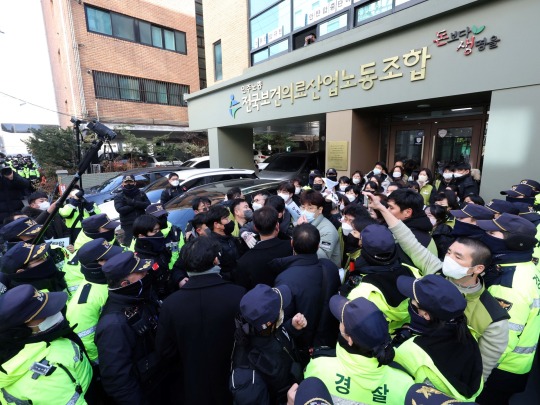
View On WordPress
0 notes
Text
History
December 13, 1545 - The Council of Trent, summoned by Pope Paul III, met to discuss doctrinal matters including the rise of Protestantism.
December 13, 1577 - Francis Drake departed Plymouth, England, in the Golden Hind on his voyage around the world.
December 13, 1642 - New Zealand was discovered by Dutch navigator Abel Tasman of the Dutch East India Company.
December 13, 1862 - During the American Civil War, the Battle of Fredericksburg occurred in Virginia as the Union Army of the Potomac under General Burnside suffered a costly defeat, losing 12,653 men after 14 frontal assaults on well entrenched Rebels on Marye's Heights. "We might as well have tried to take hell," a Union soldier remarked. Confederate losses were 5,309. "It is well that war is so terrible - we should grow too fond of it," stated Confederate General Robert E. Lee during the fighting.
December 13, 1937 - The beginning of one of the worst atrocities of World War II as the Chinese city of Nanking (Nanjing) was captured by the Japanese. Over the next six weeks, the Rape of Nanking occurred in which Japanese soldiers randomly attacked, raped and indiscriminately killed an estimated 200,000 Chinese persons.
December 13, 1981 - In its struggle to maintain Communism, the Polish government imposed martial law and took steps to stifle the growing power of the pro-democratic trade union Solidarity.
December 13, 1991 - North and South Korea signed a treaty of reconciliation and nonaggression which also formally ended the Korean War, although actual fighting had ceased in 1953.
Birthday - German writer Heinrich Heine (1797-1856) was born in Dusseldorf. Best known for his statement made a hundred years before the advent of book-burning Nazis in Germany - "Where books are burned, human beings are destined to be burned too."
Birthday - Mary Todd (1818-1882) was born in Lexington, Kentucky. She became the wife of Abraham Lincoln, the 16th U.S. President.
Birthday - American clergyman and composer Phillips Brooks (1835-1893) was born in Boston, Massachusetts. He wrote the lyrics for the popular Christmas Carol, O Little Town of Bethlehem.
0 notes
Text
Events 10.20
202 BC – Second Punic War: At the Battle of Zama, Roman legions under Scipio Africanus defeat Hannibal Barca, leader of the army defending Carthage.
439 – The Vandals, led by King Gaiseric, take Carthage in North Africa.
1216 – King John of England dies at Newark-on-Trent and is succeeded by his nine-year-old son Henry.
1386 – The Universität Heidelberg holds its first lecture, making it the oldest German university.
1453 – Hundred Years' War: Three months after the Battle of Castillon, England loses its last possessions in southern France.
1466 – The Thirteen Years' War between Poland and the Teutonic Order ends with the Second Treaty of Thorn.
1469 – Ferdinand II of Aragon marries Isabella I of Castile, a marriage that paves the way to the unification of Aragon and Castile into a single country, Spain.
1512 – Martin Luther becomes a doctor of theology.
1579 – James VI of Scotland is celebrated as an adult ruler by a festival in Edinburgh.
1596 – The Spanish ship San Felipe runs aground on the coast of Japan and its cargo is confiscated by local authorities
1649 – New Ross town in Ireland surrenders to Oliver Cromwell.
1781 – American Revolutionary War: The siege of Yorktown comes to an end.
1789 – John Jay is sworn in as the first Chief Justice of the United States.
1805 – War of the Third Coalition: Austrian General Mack surrenders his army to Napoleon at the Battle of Ulm.
1812 – The French invasion of Russia fails when Napoleon begins his retreat from Moscow.
1813 – War of the Sixth Coalition: Napoleon is forced to retreat from Germany after the Battle of Leipzig.
1864 – American Civil War: The Battle of Cedar Creek ends the last Confederate threat to Washington, DC.
1864 – American Civil War: Confederate agents based in Canada rob three banks in Saint Albans, Vermont.
1866 – In accordance with the Treaty of Vienna, Austria cedes Veneto and Mantua to France, which immediately awards them to Italy in exchange for the earlier Italian acquiescence to the French annexation of Savoy and Nice.
1900 – Max Planck discovers Planck's law of black-body radiation.
1912 – Italo-Turkish War: Italy takes possession of what is now Libya from the Ottoman Empire.
1914 – World War I: The First Battle of Ypres begins.
1921 – The Portuguese Prime Minister and several officials are murdered in the Bloody Night coup.
1922 – British Conservative MPs vote to terminate the coalition government with the Liberal Party.
1935 – The League of Nations places economic sanctions on Italy for its invasion of Ethiopia.
1943 – The cargo vessel Sinfra is attacked by Allied aircraft at Crete and sunk. Two thousand and ninety-eight Italian prisoners of war drown with it.
1943 – Streptomycin, the first antibiotic remedy for tuberculosis, is isolated by researchers at Rutgers University.
1944 – United States forces land in the Philippines.
1944 – A coup is launched against Juan Federico Ponce Vaides, beginning the ten-year Guatemalan Revolution.
1950 – China defeats the Tibetan Army at Chambo.
1950 – Korean War: The Battle of Pyongyang ends in a United Nations victory. Hours later, the Chinese Army begins crossing the border into Korea.
1950 – Iran becomes the first country to accept technical assistance from the United States under the Point Four Program.
1955 – The General Assembly of the European Broadcasting Union approves the staging of the first Eurovision Song Contest.
1956 – The Soviet Union and Japan sign a Joint Declaration, officially ending the state of war between the two countries that had existed since August 1945.
1960 – The United States imposes a near-total trade embargo against Cuba.
1973 – President Nixon rejects an Appeals Court decision that he turn over the Watergate tapes.
1974 – Niue becomes a self-governing colony of New Zealand.
1984 – A Roman Catholic priest, Jerzy Popiełuszko, associated with the Solidarity Union, is killed by three agents of the Polish Communist internal intelligence agency.
1986 – The president of Mozambique and a prominent leader of FRELIMO, along with 33 others, die when their aircraft crashes into the Lebombo Mountains.
1987 – The United States Navy conducts Operation Nimble Archer, an attack on two Iranian oil platforms in the Persian Gulf.
1987 – Black Monday: The Dow Jones Industrial Average falls by 22%, 508 points.
1988 – The British government imposes a broadcasting ban on television and radio interviews with members of Sinn Féin and eleven Irish republican and Ulster loyalist paramilitary groups.
1989 – The convictions of the Guildford Four are quashed by the Court of Appeal of England and Wales, after they had spent 15 years in prison.
2001 – SIEV X, an Indonesian fishing boat en route to Christmas Island, carrying over 400 migrants, sinks in international waters with the loss of 353 people.
2003 – Mother Teresa is beatified by Pope John Paul II.
2004 – Thirteen people are killed when Corporate Airlines Flight 5966 crashes in Adair County, Missouri, whilst on approach to Kirksville Regional Airport.
2005 – Saddam Hussein goes on trial in Baghdad for crimes against humanity.
2005 – Hurricane Wilma becomes the most intense Atlantic hurricane on record with a minimum pressure of 882 mb.
2012 – A bomb explosion kills eight people and injures 110 more in Lebanon.
2013 – One hundred and five people are injured in a train crash in Buenos Aires.
0 notes